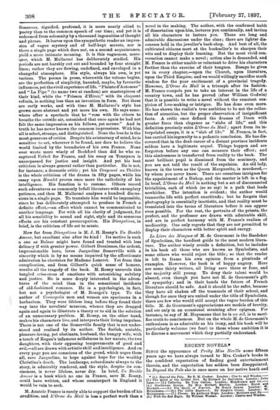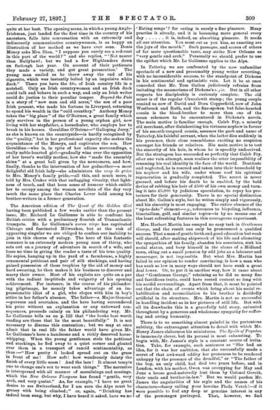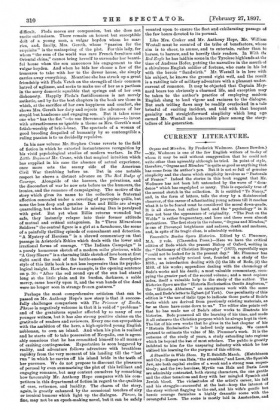RECENT NOVELS.•
SINCE the appearance of Pretty Miss Neville some fifteen years ago we have always turned to Mrs. Croker's books in the confident expectation of finding good entertainment therein, and the expectation has seldom been disappointed. In Beyond the Pale she is once more on her native heath and • (1.) Beyond the Pale. By B. M. Croker. London: Oba•to and Windua- (2.) The Quest of the Golden Girl. By Richard Le Gallienne. London : John Lane.-13.) Tatterley. By Tom Gallon. London: Hutchinson and Co.-- (4.) Gentleman George. By Mrs. Herbert Martin. London : Hurst and Binckett.—∎5.) The Spoils of Poynton. By Henry James. London : W. Heinemann.—(8.) The Little Regiment. By Stephen Crane. London : W. Heinemann.—(7.) Phroso. By Anthony Hope. Loudon: Methuen and Co — (8.) With the Rod Eagle. By William Westall. London: Chatto and Windus. quite at her best. The opening scene, in which a young Anglo- Irishman, just landed for the first time in the country of his ancestors, falls into conversation with an extremely and indiscreetly communicative countrywoman, is as happy an illustration of her method as we have ever seen. Denis Money asks Mrs. Shea, " I suppose you rarely see a red-coat in this part of the world ?" and she replies, " 'Not nearer than Ballybawl; but we had a few Highlanders down on furlough last year. On account of their petticoats they made a variety, and got great persecution.' The young man smiled as he threw away the end of his cigarette, which was instantly bolted by an impulsive white duck." There you have the it/o; of Irish country life in a nutshell. Only an Irish countrywoman and an Irish duck could talk and behave in such a way, and only an Irish writer could do justice to their peculiar temper. Beyond the Pale is a story of " new men and old acres," the son of a poor Irish peasant, who made his fortune in Liverpool, returning to spend his wealth in the "ould counthry." Anthony Money takes the " big place " of the O'Beirnes, a great family which only survives in the person of a young orphan girl, now living with her stepfather, a horsedealer, who employs her to break in his horses. Geraldine O'Beirne—" Galloping Jerry," as she is known on the countryside—is hardly recognised by the "quality," but in her professional capacity she makes the acquaintance of the Moneys, and captivates the son. How Geraldine—who is, in spite of her odious surroundings, a really noble-hearted girl—gradually wins over the opposition of her lover's worldly mother, how she " made the assembly shine " at a great ball given by the newcomers, and how, finally, thanks to the intervention of her godmother—a most delightful old Irish lady—she administers the coup de grace to Mrs. Money's family pride,—all this, and much more, is told by Mrs. Croker with that unflagging vivacity, that light- ness of touch, and that keen sense of humour which entitle her to occupy among the women novelists of the day very much the same place that Charles Lever held among his brother-writers in a former generation.
The American edition of The (best of the Golden Girl having been published a few weeks earlier than the present issue, Mr. Richard Le Gallienne is able to confront his British critics with a preliminary flourish of Transatlantic trumpets. Mr. Le Gallienne's aurea Virgo has captivated Chicago and fascinated Milwaukee, but at the risk of appearing singular we are obliged to confess our inability to join in this chorus of eulogy. The hero of this fantastic romance is an extremely modern young man of thirty, who sets out on a journey of adventure in search of a wife, and loses no time in giving the reader a taste of his true quality. He espies, hanging up in the yard of a farmhouse, a highly ornamental petticoat and pair of silk stockings, and having gained possession of these trophies by the aid of money and hard swearing, he then makes it his business to discover and marry their owner. Most of his exploits are quite on a par with the radiant ineptitude and vulgarity of his opening achievement. For instance, in the course of his philander- ing pilgrimage, he meanly takes advantage of an im- pressionable idiot of a girl, who elopes with him in boy's attire in her father's absence. The father—a Major-General —pursues and overtakes, and the hero having surrendered his prize without an explanation or any untoward con- sequences, proceeds calmly on his philandering way. Mr. Le Gallienne tells us on p. 123 that " the books best worth reading are those that lie the most beautifully." It is not necessary to discusd this contention; but we may at once admit that in real life the father would have given Mr. Le Gallienne's hero a handsome and a richly deserved horse- whipping. When the young gentleman stole the petticoat and stockings, he fled away to a quiet corner and gloated over them in a transport of rancid sentimentality, as thus :—" How pretty it looked spread out on the grass in front of me ! How soft! how wondrously dainty the finish of every little seam ! And the lace ! It almost tempts one to change one's sex to wear such things." The narrative is interspersed with all manner of moralisings and musings, which the New Orleans Picayune has found " gentle, very arch, and very quaint." As, for example, "I have no great desire to see Switzerland, for I am sure the Alps must be greasy with being climbed;" or, again, "Drinking has indeed been sung, but why, I have heard it asked, have we no
Eating songs' ? for eating is surely a fine pleasure. Many practise it already, and it is becoming more general every day it is, indeed, an absorbing pleasure. It needs all our attention. You must eat as you kiss, so exacting are the joys of the mouth." Such passages, and scores of others of far more questionable taste, may strike New Orleans as "very gentle and arch." Personally we should prefer to use the epithet which Mr. Le Gallienne applies to the Alps.
In Tatterley we are confronted by the now unfamiliar spectacle of a new and presumably young writer reverting, with no inconsiderable success, to the standpoint of Dickens in his sentimental and optimistic vein. Let it be at once conceded that Mr. Tom Gallon judiciously refrains from imitating the mannerisms of Dickens's s.yie. But in all other respects his discipleship is curiously complete. The old miser is of the regular Chuzzlewit stamp ; the young couple remind us now of David and Dora Copperfield, now of John Westbrook and Ruth, and the fine-spoken but false-hearted cousin is the blood-brother to more than one of the mean schemers to be encountered in Dickens's novels. The main motive is familiar enough. Caleb Fry, a miserly old merchant, after disinheriting his virtuous nephew in favour of his smooth-tongued cousin, assumes the garb and name of Tatterley, his faithful servant, when the latter dies suddenly in his presence, their close resemblance exciting no suspicion amongst his friends or relatives. His main motive is to test the sincerity of his heir, in whom he is speedily undeceived. But the stratagem has succeeded so perfectly that Caleb Fry, after one vain attempt, soon realises the utter impossibility of resuming his real identity in the face of the world. Destitute and neglected, he is rescued and taken into their household by his nephew and his wife, under whose roof his spiritual regeneration is gradually completed. The secret is never guessed, and before his death he is enabled, by the bold device of robbing his heir of £500 of his own money and turn- ing it into £5,000 by judicious speculation, to repay his pro- tectors for their generosity. There is no special distinction about Mr. Gallon's style, but he writes simply and vigorously, and his sincerity is most engaging. The entire absence of the " up-to-date " element—e.g., references to bicycling, influenza, bimetallism, golf, and similar topics—is by no means one of the least refreshing features in this courageous experiment.
Mrs. Herbert Martin has essayed no easy task in Gentleman George, and the result can only be pronounced a qualified success. That a man of gentle birth and good education but weak will should, after making shipwreck of his life and alienating the sympathies of his family, abandon his associates, sink his social status, and bury himself in the slums of a Midland town, eking out a small pension by odd jobs as a labourer and messenger, is not impossible. But what Mrs. Martin has failed in our opinion to render convincing, is how a man who has sunk so low in many ways should not have sunk a great deal lower. Or, to put it in another way, how it came about that " Gentleman George," retaining as he did so many fine and fastidious traits, could have rested content so long with his sordid surroundings. Apart from that, it must be pointed oat that the chain of events which bring about his social re- habilitation and reconciliation to his brother is decidedly artificial in its structure. Mrs. Martin is not so successful in handling incident as in her pictures of still life. But with all its drawbacks this is a gracefully told story, animated throughout by a generous and wholesome sympathy for suffer- ing and erring humanity.
There is to us something almost painful in the portentous subtlety, the extravagant attention to detail with which Mr. Henry James elaborates his miniatures. The Spoils of Poynton is immensely clever, but its perusal is most exhausting. To begin with, Mr. James's style is a constant source of irrita- tion. Take, for example, such sentences as "She had an idea, for it was her ambition, that she successfully made a secret of that awkward oddity her proneness to be rendered unhappy by the presence of the dreadful," or "The father of the boy, an only child, had died two years before, and in London, with his mother, Owen was occupying for May and June a house good-naturedly lent them by Colonel Gereth, their uncle and brother-in-law." But we would pardon Mr. James the angularities of his style and the names of his characters—fancy calling your heroine Fleda Vetch !—if it were possible to feel any deep or genuine interest in any of the personages portrayed. That, however, we find difficult. Fleda moves our compassion, but she does not excite enthusiasm. There remain an honest but susceptible dolt of a young man, a vulgar hoyden whom be mar- ries, and, finally, Mrs. Gereth, whose " passion for the exquisite" is the mainspring of the plot. For this lady, for whom "the sum of the world was rare French furniture and Oriental china," cannot bring herself to surrender her beauti- ful house when the son announces his engagement to the vulgar hoyden. And when he bids her choose a few of the treasures to take with her to the dower house, she simply carries away everything. Meantime she has struck up a great friendship with Fleda Vetch on the strength of their common hatred of ugliness, and seeks to make use of her as a partisan in the sorry domestic squabble that springs out of her own dishonesty. Happily Fleda's fastidiousness is not merely iestbetic, and by far the best chapters in the book are those in which, at the sacrifice of her own happiness and comfort, she shows Mrs. Gereth her duty and rejects the advances of her stupid but handsome and engaging son. But it takes some one who " has the fist "—to use Stevenson's phrase—to invest with attractiveness so ignoble a theme as Mrs. Gereth's mad fetish-worship of bric•h•brac. The spectacle of a woman of good breeding despoiled of humanity by so contemptible a ruling passion is to us decidedly repulsive.
In his new volume Mr. Stephen Crane reverts to the field of fiotion in which he extorted instantaneous recognition by his vivid psychological studies of modern warfare. In The Little Regiment Mr. Crane, with that magical intuition which has supplied in his case the absence of actual experience, once more sets the seamy side of the American Civil War throbbing before us. Bat in one notable respect he shows a distinct advance on The Red Badge of Courage. Alongside of the horrors, the privations, and the discomfort of war he now sets before us the humours, the ironies, and the romance of campaigning. The motive of the story which gives its name to the collection is fraternal affection ooncealed under a covering of porcupine quills, but none the less deep and genuine. Dan and Billie are always quarrelling, but when the latter is missing Dan is paralysed with grief. But yet when Billie returns wounded but safe, they instantly relapse into their former attitude of mutual and critical antagonism. In " Three Miraculous Soldiers" the central figure is a girl at a farmhouse, the scene
of a painfully thrilling episode of concealment and detection. "A Mystery of Heroism" is a shrewd commentary on that passage in Aristotle's Ethics which deals with the lower and
irrational forms of courage. " The Indiana Campaign " is a purely humorous sketch of a modern miles gloriosus, while
"A Grey Sleeve " is a charming little sketch of love born at first sight amid the reek of the battle-smoke. The descriptive style of this little book is not less impressive than its psycho-
logical insight. How fine, for example, is the opening sentence on p. 30: "After the red round eye of the sun had stared long at the little plain and its burden, darkness, a sable mercy, came heavily upon it, and the wan hands of the dead were no longer seen in strange frozen gestures."
Perhaps the most comprehensive criticism that can be passed on Mr. Anthony Hope's new story is that it success- fully challenges comparison with The Prisoner of Zendu. .Phroso is negatively welcome in that it is void of " problems " and of the gratuitous squalor affected by so many of our younger writers, but it has also strong positive claims on the gratitude of readers and reviewers. Every one can sympathise with the ambition of the hero, a high-spirited young English nobleman, to own an island. And when his plan is realised and he starts off to take possession of Neopalia, one is agree- ably conscious that he has committed himself to all manner of exciting contingencies. Expectation is soon beggared by reality, and adventure follows adventure with breathless rapidity from the very moment of his landing till the "last run " in which he carries off his island bride in the teeth of her pursuers. We do not propose to discount the pleasures of perusal by even summarising the plot of this brilliant and engaging romance, but may content ourselves by remarking how favourably Mr. Anthony Hope compares with his com- petitors in this department of fiction in regard to the qualities of ease, reticence, and lucidity. The charm of the story, again, is greatly enhanced by the occasional touches of airy or ironical humour which light np the dialogue. Phroso, in fine, may not be an epoch-making novel, but it can be safely
counted upon to ensure the fleet and exhilarating passage ol the few hours devoted to its perusal.
Like Mrs. Croker and Mr. Anthony Hope, Mr. William Westall must be counted of the tribe of benefactors, whose aim is to cheer, to amuse, and to entertain, rather than to harass, to harrow, and to horrify their readers. In With the Red Eagle he has laid his scene in the Tyrolese highlands at the time of Andreas Hofer, putting the narrative in the mouth ol a chivalrous English soldier of fortune, who casts in his lot with the heroic " Sandwirth." Mr. Westall is in love with his subject, he knows the ground right well, and the result is a rattling tale of military adventure with a pleasant under- current of romance. It may be objected that Captain May- nard bears too obviously a charmed life, and exception may be taken to the author's practice of employing modern English slang to lend vigour and raciness to the dialogue. But such trifling flaws may be readily overlooked in a tale brimful of exciting incident, and told with that buoyant geniality and straightforward simplicity which long ago earned Mr. Westall an honourable place among the story- tellers of his generation.




































 Previous page
Previous page